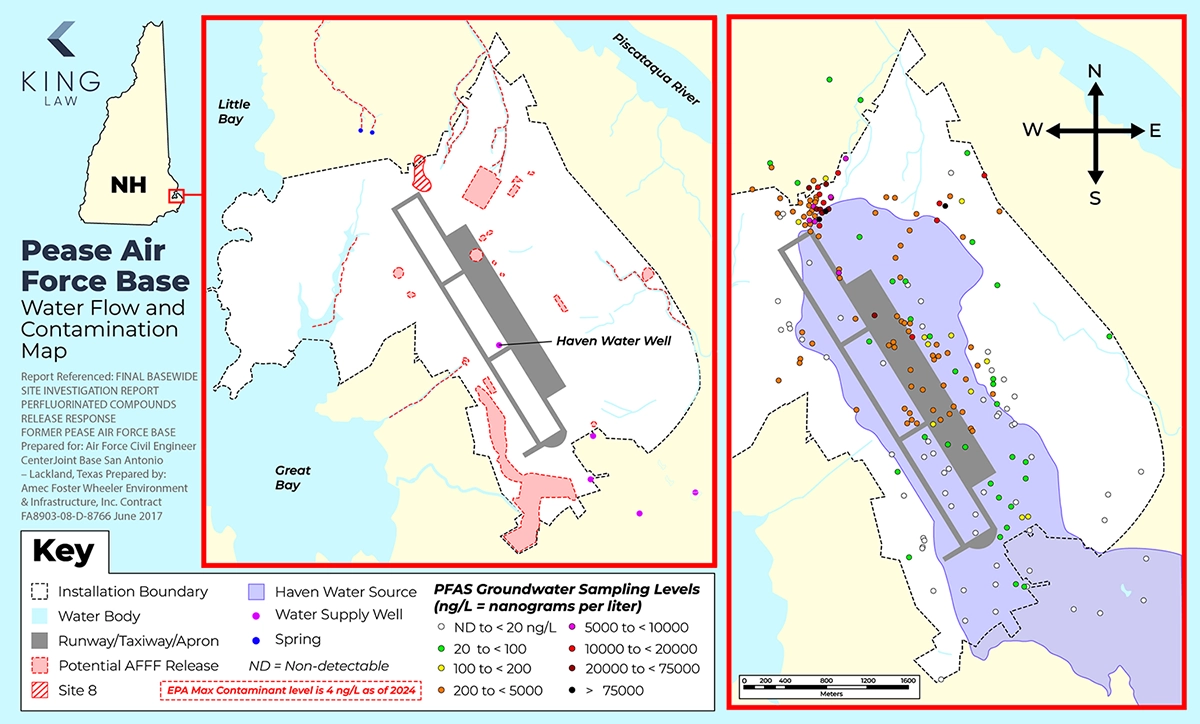
Pease Air Force Base Water Contamination Lawsuit Overview
Although initially established as a municipal airport in the 1930s, Pease Air Force Base would spend decades serving as a bomber base. It housed multiple aircraft, including the B-52 Stratofortress. The base was one of 86 installations selected for closure in 1988. On March 31, 1991, the base stopped active duty operations. Part of the base is currently being used by the Air National Guard and is home to the 157th Air Refueling Wing and the KC-46A Pegasus.
Over the past decade, the former military base has come under scrutiny for potentially contaminating nearby water sources. Sampling of drinking water located on and off-base conducted in 2014 indicates high levels of Per- and Polyfluoroalkyl Substances (PFAS). These forever chemicals are dangerous for humans and the environment.
Individuals who were stationed at or near Pease Air Force Base may be entitled to compensation if they have been diagnosed with an adverse health condition related to PFAS exposure. The attorneys at King Law have extensive experience representing individuals in military base water contamination lawsuits. Contact our office today to schedule a free, no-obligation consultation.
Pease Air Force Base Water Contamination Lawsuit Updates
April 2024: Remediation efforts continue at the base and nearby communities. Investigations continue into whether legal action can be taken for those who suffered health effects from PFAS exposure in contaminated water at the base.
December 2021: Enrollment ends in the Pease Study. Nearly 1,000 community members are included in the study.
October 2019: Enrollment begins in the Pease Study conducted by the Agency for Toxic Substances and Disease Registry (ATSDR). The study is the first national, multi-site study to look at the effects of PFAS exposure through contaminated drinking water.
August 2015: The EPA issued an Administrative Order (AO) under the Safe Drinking Water Act to the Air Force. The AO requires the Air Force to take several steps, including investigating and remediating PFAS sources and restoring the Pease aquifer.
April 2014: Sampling of the Pease Tradeport public water supply wells and Haven Well detects perfluorooctanoic acid (PFOA) and perfluorooctane sulfonate (PFOS) above the Public Health Advisory permissible by the Environmental Protection Agency (EPA) at the time.
On this page:
History of Toxic Exposure at Pease Air Force Base
Pease Air Force Base Water Contamination Map
Contaminants Found in Pease AFB Drinking Water
Current Water Quality at Pease Air Force Base
Health Risks and Symptoms Connected to Drinking Water at Pease AFB
Eligibility Criteria for Pease AFB Water Contamination Lawsuit
Pease AFB Water Contamination Settlement and Payout Amounts
How to File a Pease AFB Water Contamination Lawsuit
Statute of Limitations for Pease AFB Water Contamination Claims
History of Toxic Exposure at Pease Air Force Base
In 1990, environmental concerns at Pease Air Force Base led the Environmental Protection Agency (EPA) to place the Superfund site on the National Priorities List. It was officially closed on March 31, 1991, as part of the Defense Base Realignment and Closure Act of 1988. While part of the military installation continues to be utilized by the Air National Guard, much of the land has been transferred to other agencies.
In 1992, over one thousand acres of the former base were transferred to the U.S. Fish and Wildlife Service for the establishment of the Great Bay National Wildlife Refuge. The Pease International Tradeport was also constructed on the site.
Due to contamination from the base’s former operations, no residential housing is allowed to be built at the location. However, many businesses and former military service members are believed to have been exposed to dangerous toxins, including PFAS, as a result of the Air Force’s use of fluorinated Aqueous Film-Forming Foam (AFFF). The Air Force has invested millions of dollars to clean up the site and treat water contaminated by the forever chemicals.

Pease Air Force Base Water Contamination Map

Sampling of drinking water at Pease Air Force Base in 2014 detected high levels of PFAS in Pease Tradeport public water supply wells and the Haven Well. The Haven Well is located near the airfield where AFFF was released. Additionally, Site-8 continues to undergo investigation and remediation. The EPA has identified a total of 85 sites on the former military installation for remediation.
Contaminants Found in Pease AFB Drinking Water
The main contaminants found in Pease Air Force Base drinking water are Per- and Polyfluoroalkyl Substances (PFAS). PFAS are forever chemicals that may pose a risk to humans and the environment. It is believed that PFAS exposure may increase a person’s risk of developing certain kinds of cancer.
Sampling from wells on or near the base has found PFAS levels at 2,500 parts per trillion, substantially higher than the EPA’s Public Health Advisory recommendations at the time of 70 parts per trillion. Today, the EPA has issued a proposed maximum contaminant level of 4 parts per trillion, noting that virtually no level of exposure to PFAS is safe.
Current Water Quality at Pease Air Force Base
The Air Force continues to monitor and sample water at and near Pease Air Force Base. Water sampling provided by the City of Portsmouth indicates that some wells have PFAS levels exceeding the EPA’s new proposed maximum contaminant levels of 4 parts per trillion; however, the city remains in compliance with all state and federal regulations currently in place.
Water Treatment Efforts at Pease Air Force Base
The Air Force has undergone extensive efforts to remediate the contamination caused by its use of AFFF at Pease AFB. After the issuance of an Administrative Order by the EPA, the Air Force began construction of a groundwater pump and treatment system designated Airfield Interim Mitigation System (AIMS). Eventually, the Haven aquifer was restored, and carbon filters were installed. In 2021, the new Pease Water Treatment Facility was dedicated, and the Haven Well was reactivated.
Water monitoring continues at and around the base. In addition, a large study is conducted by the ATSDR to determine the amount of PFAS in the blood of residents who may have been exposed to contaminated water.
Health Risks and Symptoms Connected to Drinking Water at Pease AFB
There are a number of health risks associated with drinking water contaminated by PFAS. It is believed that PFAS exposure could lead to an increased risk of developing certain kinds of cancers.
Potential health risks linked to PFAS exposure at Pease Air Force Base:
- High cholesterol
- High blood pressure
- Heart disease
- Diabetes
- Infertility
- Kidney disease
- Thyroid disease
- Liver disease
- Testicular cancer
- Kidney cancer
- Low birth weight
- Accelerated puberty
- Bladder cancer
Our law firm is currently evaluating cases where individuals have been diagnosed with:
- Kidney Cancer
- Liver Cancer
- Prostate Cancer
- Testicular Cancer
- Thyroid Cancer & Thyroid Disease
- Ulcerative Colitis
Individuals stationed at or near Pease Air Force Base are strongly encouraged to seek regular health check-ups and screenings to ensure that any adverse health conditions are promptly diagnosed and treated.
Eligibility Criteria for Pease AFB Water Contamination Lawsuit
Successful claimants must meet certain eligibility criteria to file a lawsuit based on water contamination at Pease Air Force Base. A key factor in these cases is the duration of exposure. Generally, individuals will need to prove that they sustained at least 6 months of exposure to contaminated water in order to file a claim. Additionally, they will need to show a specific diagnosis, such as a qualifying type of cancer or thyroid disease.
Our law firm is currently evaluating cases where individuals have been diagnosed with:
- Kidney Cancer
- Liver Cancer
- Prostate Cancer
- Testicular Cancer
- Thyroid Cancer
- Thyroid Disease
- Ulcerative Colitis
It is strongly recommended that you consult with an attorney as soon as possible to determine whether you meet the eligibility requirements for a Pease Air Force Base water contamination lawsuit. A legal evaluation is often critical for assessing the potential of your claim. An attorney can provide the guidance you need to make informed decisions about your case. They can also help set realistic expectations for the lawsuit’s timeline and outcome.
Pease AFB Water Contamination Settlement and Payout Amounts
Potential settlement and payout amounts in Pease Air Force Base water contamination lawsuits are expected to be between $30,000 and $500,000. Prior cancer-related lawsuits frequently settled within the range of $100,000 to $300,000.
There may be several factors that influence your settlement, but the average is expected to be around $250,000. Individuals who were younger at the time of diagnosis or had an extended duration of active illness may receive larger settlements. There is the potential for some cases to reach values at or near one million dollars.
Claimants with minor injuries or those with less proof of connection between the base’s contaminated water and their illness may see values between $30,000 and $75,000. It is important to note that settlements are typically lower than potential trial verdicts, but there is no guarantee of a successful outcome at trial.
How to File a Pease AFB Water Contamination Lawsuit
When filing a Pease Air Force Base water contamination lawsuit it is imperative to follow the guidance of your attorney. An attorney can help you navigate the complexities of the legal process and will assist you through each phase of the lawsuit.
Steps for filing a Pease Air Force Base water contamination lawsuit:
- Determine eligibility. With the help of your attorney, you can determine whether you meet the criteria necessary to file a claim.
- Prepare the claim. Your legal team will help you prepare your claim, including gathering the necessary evidence to support your case.
- File the case. The next step is filing the actual documents necessary to begin your case.
- Complete discovery. Once the case is filed, it will enter the discovery phase. Your attorney will have the opportunity to review evidence and interview witnesses.
- Enter negotiations. Once the discovery phase is complete, your attorney may enter negotiations to try to reach a favorable settlement in the case.
- Set trial. If a settlement cannot be reached, the case will be set for trial.
Evidence to Support Your Claim:
A successful claim is usually dependent on evidence. Evidence is often necessary to substantiate your claim. It is important to discuss your case with an attorney to determine what evidence may be necessary to prove your case.
Evidence that may be used to support your claim:
- Medical records
- Military orders
- Environmental studies
- Pease Study results
- Water sampling results
- Blood tests
Statute of Limitations for Pease AFB Water Contamination Claims
All Pease Air Force Base water contamination contamination claims are subject to a statute of limitations. The statute of limitations is a state-specific timeframe within which a person must file their claim to qualify for compensation.
Pease Air Force Base Water Contamination Lawyers
If you have been diagnosed with a condition related to PFAS exposure after being stationed at or near Pease Air Force Base, you may be eligible for compensation. At King Law, we are well-versed in representing individuals who suffered illness or injury as a result of water contamination at military bases across the U.S. Contact our office today to schedule a free consultation.

